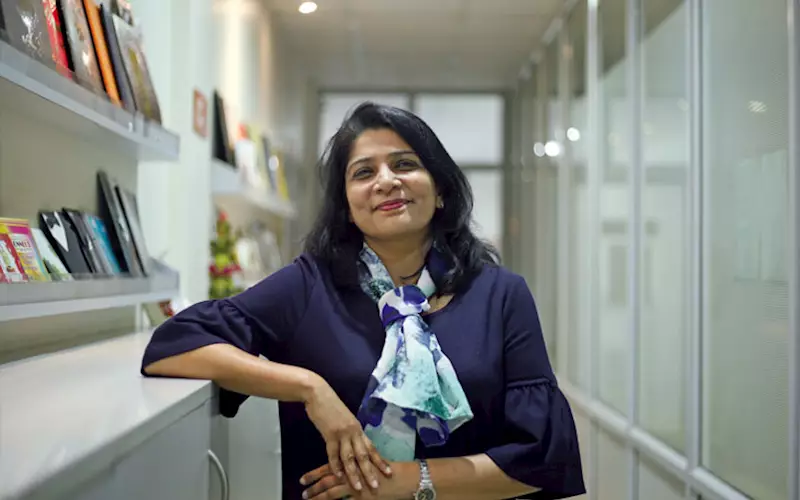Women in training and education
As Radha Ramesh of Dhote Offset Technokrafts rightly points out, as compared to 10 years ago, today there are many more women willing to enter the print field. The government has also recognised Print as a skill under the Media & Entertainment sector arm of National Skill Development Council (NSDC).
These developments wouldn’t have been possible without the effort of the institutes and colleges that are striving to uplift the demand for print professionals through quality training.
Here, trainers from the print sector talk about the possibilities and challenges in the industry.
11 Mar 2020 | By PrintWeek Team
Prof Padmaja Joshi, PVG College of Engineering and Technology
 Is print now a better industry for women to work in?
Is print now a better industry for women to work in?
As our society is getting transformed though slowly towards every little Dos and Don'ts, especially for so-called "working woman", such types of questions are sure to arise. More than the industry ready to accept women, I would say it is the other way around.
Please explain why …
A woman becomes more and more aware of herself, she has the choice to choose the area she wants to explore. And so, she makes herself eligible to work in the area of choice, may it be printing. If we talk only about the print industry being ready to accept women, well! Today, technology is getting transformed and this has created many opportunities in every department. A variety of skill sets are demanded by the industry, plus interdisciplinary opportunities are available. This is a very promising picture for women to step into the printing industry.
What’s the best way to attract more women into the sector?
Apart from offering a safe work environment, equal, non-bias opportunities, a kind of congenial environment to work in, would help to convince more women to choose this career path. Though print is amongst one of the largest industries worldwide, awareness in terms of a "good career-building" option needs to be worked out. Awareness about the higher studies (postgraduate), will also help her to start the profile building at a higher note. Work from home, flexible work timings, ...could be a few options to attract apart from the points mentioned above.
Do women coming into the industry need role models? Who is your role model in our industry - and why so?
Well, role models are good to look at. More than role models I strongly feel, mentoring is what can help her scale greater heights. Many female role models, not just in print but other industries are always a big motivation. But in my opinion, a role model need not be female for the sake of having one.
In fact the more neutral we are towards these "male-female" debates, the better it is for the society and for all "humans".
Radha Ramesh, general manager- HR and admin Dhote Offset Technokrafts

Is print now a better industry for women to work in?
Traditionally print has been considered a male bastion with very few women entering this field. However, the last few years have seen an improvement in this trend with many women especially the younger generation willing to consider it as a career option. Moreover, the print industry is witnessing a paradigm shift in its approach towards hiring new talents irrespective of their gender. This can be considered a progressive step in the outlook of the industry, something which needs to be endorsed by everyone.
What is the best way to attract more women into the sector?
Despite being one of the most technologically innovative and specialised industry, print tends to get ignored in the larger scheme of things, when it comes to being considered as a career option. This is due to the fact that it is not as widely recognised in India as in the western countries. Print as a subject option is confined to just a few institutions hence the awareness is not widespread. Plus there are too few women students opting for it. It requires a concerted effort from everyone right from education institutions, print industry, peers to create awareness about it being a lucrative field. There is also a misconception of women being ignored for niche positions in print considering it is male dominant.
The silver lining is that as compared to 10 years ago, today there are many more women willing to enter the print field. The government has also recognised Print as a skill under the Media & Entertainment sector arm of National Skill Development Council (NSDC), thanks to the effort of institutes like DOT Institute of Graphic Communication which was instrumental in ensuring print media technology is recognised as a specialised skill by NSDC. Where women are now standing shoulder to shoulder with men, print needs to reach out to the vast women workforce in the employable sector and connect with them and show their future in print.
Do women coming into the industry need role models? Who is your role model and why so?
I would say more than a role model, a woman needs to get a sense of equality, of being assured of being treated at par with her male colleagues. One does not need a role model, it is her belief in herself, her knowledge, values which will take her to the highest echelons of her career, whichever field she may choose. More than a role model she can take inspiration from women who have dared to be different and who have successfully carved a place for themselves in traditional fields dominated by men.
So we can take inspiration from Surekha Yadav (the first train driver), Bachendri Pal (first Indian woman to climb Mt. Everest), Wing Commander Shaliza Dhami (first woman officer to become a Flight Commander) and not to forget India Gandhi, the first lady Prime Minister of India, a woman of unparalleled courage and determination.
Ramalakshmi Nizam, director, YesGo

Is print now a better industry for women to work in? Please explain why ...
I started working in this industry since 1998. I didn’t face any gender restriction. So according to me, print is always a good industry for women to work in
What’s the best way to attract more women into the sector?
Work from home is the most supporting concept for women, however, it doesn’t suit our industry. Perhaps relaxing during (limited time/hours – for hospital/school) working hours will be helpful for passionate working mothers.
Do women coming into the industry need role models? Who is your role model in our industry - and why so?
I don’t think so because every individual should be identified by their attitude and unique performance. I always believe myself as the role model in this industry. This motivates me to take on more challenges in my profession
If you want to share your point of view about the above story or about women in print, please email: charmiane.alexander@haymarketsac.com











 See All
See All